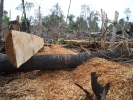 Global companies that produce and use commodities such as palm oil and soy are moving too slowly to cut deforestation, suggesting international goals to protect forests will not be met, groups that monitor business efforts said on Monday. Agricultural products - including beef and paper - account for over two thirds of tropical deforestation worldwide, said the Global Canopy Programme. Its third annual assessment - tracking the policies of 500 companies, governments and financial institutions that have the most influence on tropical forests - suggests that ambitious 2020 and 2030 goals to protect those forests are unlikely to be achieved.
Global companies that produce and use commodities such as palm oil and soy are moving too slowly to cut deforestation, suggesting international goals to protect forests will not be met, groups that monitor business efforts said on Monday. Agricultural products - including beef and paper - account for over two thirds of tropical deforestation worldwide, said the Global Canopy Programme. Its third annual assessment - tracking the policies of 500 companies, governments and financial institutions that have the most influence on tropical forests - suggests that ambitious 2020 and 2030 goals to protect those forests are unlikely to be achieved.
"More needs to be done to increase the rate of change, and uptake of these policies," said Tom Bregman, who manages the "Forest 500" project. "You're not even getting to the policies being in place, let alone implementation by 2020, so clearly there is still a long way to go."
The 2014 New York Declaration on Forests set a goal to at least halve the rate of loss of natural forests globally by 2020, and strive to end it by 2030. The declaration also pledged to help the private sector eliminate deforestation from the production of agricultural commodities by 2020.
The results of the 2016 Forest 500 assessment show that 57 percent of the 250 companies tracked have either weak policies or no policies at all to curb deforestation in their operations.
In the last three years, the number of companies with policies to cut deforestation in the production of each forest-related commodity they use increased by only 5 percent.
Bregman said that unless more companies apply such broad policies, "you're not going to get to the holistic, deforestation-free planet we desire".
Loopholes must be closed that displace deforestation to places with less stringent regulations, and allow companies that clear forests to sell to buyers without environmental standards, the Global Canopy Programme said.


